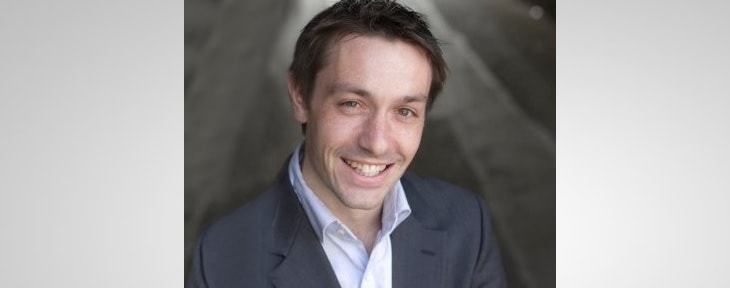Pictured: Aidan Corbett, CEO and co-founder, Wayflyer
This article was originally published in the current digital edition of the Business & Finance magazine. Read here: businessandfinance.com/user-login/
Aidan Corbett is co-founder and CEO of Wayflyer, an e-commerce brand. During his MBA in London he caught the entrepreneurial bug, and learned how to code at night. His focus has always been around data analytics, and that morphed eventually into e-commerce. Three years ago, he set up Conjura, which does data analytics for large retailers. With Wayflyer, he found they could self-serve that solution to small businesses by giving the analytics away for free, and then funding the businesses through the difficult growth phase to profitability.
B&F: What is the potential for e-commerce in an Irish context?
If you look at the business model of e-commerce, it doesn’t suffer from a lot of the barriers that normal start-ups do. Look at a lot of the e-commerce companies on our platform, they haven’t raised any outside money, and they can get pretty big. They also don’t have teams of engineers. Sophisticated e-commerce companies doing 50-60 million in revenue may not have any engineers. And what they’re able to do is use off-the-shelf tools to get up and running really quickly, so they may use Shopify to host their website, they may use a tool called Klayvio to handle all their email marketing, they’ll look after Facebook and Google ads themselves. It’s a type of start-up that can scale really quickly because you don’t need a sales team, and you don’t need an engineering team either. It’s actually a really great type of business to start up yourself if you are interested in becoming an entrepreneur.
B&F: What is the current state of e-commerce in 2020?
It varies dramatically depending on the vertical you are in. We were beginning to ramp up our operations in March when Covid-19 hit, and we paused because we obviously wanted to see what the impact would be. What we found was that if your products were outside of hospitality or travel or outdoor leisure, and you did not have a very high price, you were doing better than normal. A lot of the big advertisers on Facebook and Google Ads had left the platform – Booking.com, Expedia, Airbnb – they just left because obviously demand had fallen away.
These ad platforms had a lot of spots to sell, so the price went down, and in addition to that, we are all on our screens more due to lockdown, so they have even more inventory to sell. Suddenly the cost of acquiring a new customer through paid advertising fell away really quickly, and as a consequence, the performance of all of our businesses went up, as long as you weren’t in one of those industries directly affected.
B&F: What are the more general challenges of running an e-commerce brand?
The challenge of running an e-commerce brand is distribution and getting customers. What we find with a lot of e-commerce entrepreneurs is that they are really focused on the product, and their love is on the product, and they believe that if you build a great product, then customers will come. That’s not the case, so if you are an e-commerce entrepreneur you need to figure out really early on what’s going to make the difference in terms of you requiring customers at a lot lower price than what you are going to profit from.
It’s a type of start-up that can scale really quickly because you don’t need a sales team, and you don’t need an engineering team either. It’s actually a really great type of business to start up yourself if you are interested in becoming an entrepreneur.
Overly-focusing on profit to the detriment of distribution is often the biggest challenge we see for e-commerce entrepreneurs. In addition to that, in an Irish context, you need to think international really quickly. To get traction within a segment is to be very specific on who you are targeting. If you’re very specific on who you’re targeting, in an Irish context, it means that’s very few people. When you are beginning to think about your business, always focus on a European market or a US market. Don’t focus on an Irish market because your target audience is likely to be much too small for you to scale.
B&F: What is your experience of growing an Irish business?
When you’re growing a business, it really pays to be ambitious. You’re less likely to succeed if you’re not ambitious. That isn’t intuitively the case, but if you want to raise money from outside investors, if you want to create a business plan that goes international, if you want to excite employees about joining you, it’s much easier to do that if you are being ambitious.
We were beginning to ramp up our operations in March when Covid-19 hit, and we paused because we obviously wanted to see what the impact would be. What we found was that if your products were outside of hospitality or travel or outdoor leisure, and you did not have a very high price, you were doing better than normal.
When I did my first start up, I didn’t raise any external money. I didn’t think I was ready for it. I wasn’t sure if we were capable of raising it. This time around, having been in the start-up game, this being my third venture, we went and raised $2.9 million within the first six or seven months because we had an aggressive plan and because we had the context of, ‘look, we’re good enough already to go international,’ and that’s really important. Having that ambitious mindset, that’s hard to do when you’re in a small country.
In many cases, an ambitious stance helps you hire more employees, helps you raise more money, and gives you a greater chance of success.
B&F: What insights do you use to grow online revenue?
Banks find it hard to fund e-commerce because e-commerce companies don’t have a lot of assets. In addition to that, e-commerce tends not to have recurring revenue, so if you’re going to advance the money, you need a way of showing they have a really strong business without having a lot of assets and without having recurring revenue.
I think what’s going to happen is that e-commerce is going to continue to expand past Covid-19, and I think small brands are going to do even better because I don’t think the high street is going to come back and claim the position they had with the public to the extent they did previously.
The way you do that is by looking at their data, so what we do when a company signs up is we get them to share their primary marketing channels, which is inevitably Google, Facebook and Instagram, we get them to share their website data through Google analytics, and we normally look at some transaction data as well.
B&F: How do you see the future of e-commerce playing out in a post-Covid world?
One of the things that actually happened in the retail world was that one of the larger retailers, particularly those on the high street, before Covid-19 they were struggling, and when they were moving online, they obviously had a lot of other infrastructure to take into account, when they were building out their online offering. It was actually easier for small companies at the time, like Boohoo, to get up and running, because they could use the off-the-shelf tools that we discussed earlier on, and they became very sophisticated online really quickly, and they built a lot of it in-house without using the agencies.
What Covid-19 has done has taken some of the difficulties the high street agencies had and has magnified them by fifty. When you see numbers at the moment where online e-commerce is growing rapidly as a percentage of the total, that is obviously due to the fact that people are ordering from home due to the lockdown. What is also happening is the fact that nothing is coming through the high street. I think what’s going to happen is that e-commerce is going to continue to expand past Covid-19, and I think small brands are going to do even better because I don’t think the high street is going to come back and claim the position they had with the public to the extent they did previously. You can see this at the moment with some of the transactions that are going on in the UK where some brands like Karen Millen and TM Lewin are being bought out, but they don’t intend on opening a lot of the stores that they had open previously.






